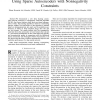Free Online Productivity Tools
i2Speak
i2Symbol
i2OCR
iTex2Img
iWeb2Print
iWeb2Shot
i2Type
iPdf2Split
iPdf2Merge
i2Bopomofo
i2Arabic
i2Style
i2Image
i2PDF
iLatex2Rtf
Sci2ools
CORR
2016
Springer
2016
Springer
Deep Learning of Part-based Representation of Data Using Sparse Autoencoders with Nonnegativity Constraints
Abstract—We demonstrate a new deep learning autoencoder network, trained by a nonnegativity constraint algorithm (NCAE), that learns features which show part-based representation of data. The learning algorithm is based on constraining negative weights. The performance of the algorithm is assessed based on decomposing data into parts and its prediction performance is tested on three standard image data sets and one text dataset. The results indicate that the nonnegativity constraint forces the autoencoder to learn features that amount to a part-based representation of data, while improving sparsity and reconstruction quality in comparison with the traditional sparse autoencoder and Nonnegative Matrix Factorization. It is also shown that this newly acquired representation improves the prediction performance of a deep neural network.
Related Content
| Added | 31 Mar 2016 |
| Updated | 31 Mar 2016 |
| Type | Journal |
| Year | 2016 |
| Where | CORR |
| Authors | Ehsan Hosseini-Asl, Jacek M. Zurada, Olfa Nasraoui |
Comments (0)

